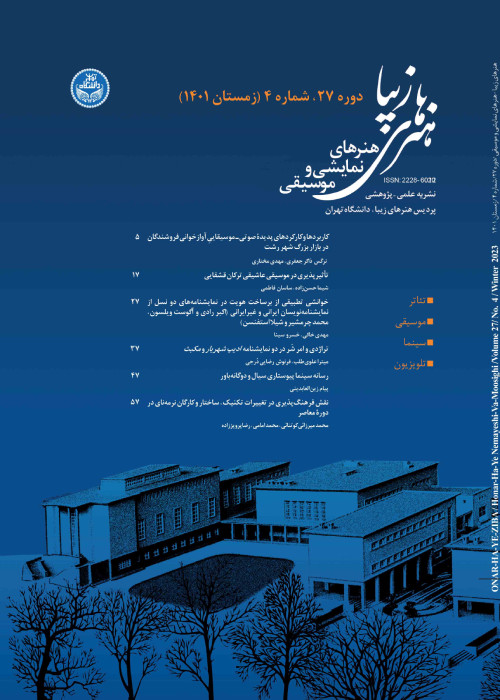From the Wedding Festivity to the Music School: Master Apprentice System and Changes in the Methods of Transmission of Tradition in the Ashiq Poetic-musical Art
Author(s):
Article Type:
Research/Original Article (دارای رتبه معتبر)
Abstract:
Ashiqs who have had different characteristics, usage and functions in the history, are one of the players, singers, poets and storytellers throughout Turkic-speaking cultures, located in Turkey, the Caucasus, and Central Asia, as well as from the northwest to central provinces of Iran, such as Qom and Zanjan. The ashiq art tradition in Zanjan is performed in many contexts, including wedding ceremonies, coffee houses, concerts, urban festivals, and professional festivals. Although each of these contexts has its own characteristics but the most important and common context, however, is wedding ceremony. This context is not only the main source of ashiq’s income, but also this is during these wedding ceremonies that nearly all parts of the society can face with ashiq, hear and see his performance and request their desired music from him and finally evaluate ashiq and his performance. These poet-musicians are required to learn some skills in order to begin to perform in the wedding ceremonies as a professional musician. In this paper, based on qualitative research method and fieldwork in Zanjan, we are going to study the ways in which this tradition is going on in the culture. This is important question, because we can understand the values of the system during the process of learning and teaching. Using theoretical concepts of Edward Hall, who propose informal, formal and technical learning, and Alan Merriam, who propose enculturation, socialization, education and schooling, we will show that in the traditional (pre-modern) methods of transmission of tradition ashiqs have learnt their profession informally through the process of enculturation in the wedding ceremonies. It was necessary for each apprentice to accompany a master ashiq by playing qaval (a kind of drum) in the ceremonies for many years in order to learn the ways of playing, singing and managing ceremony and audience. But, today, during the process of learning and teaching through modern methods, some changes occurred which caused separation of apprentice from context of learning of this profession (wedding ceremonies) which, in turn, caused disappearance of some musical and poetic genres, such as dastan. Later, all genres were introduced to apprentice in the wedding ceremonies, but today ashiqs will no longer be familiar with the context of performance and will be unable to make an active contact with their audience, perform audience’s musical and poetic requests and manage the ceremony. Moreover, modern methods of transmission of tradition divided the process of learning into separated parts: some musical courses are held for playing saz, the books are used for learning and memorizing poems and then CDs and cassettes for learning dastans and havas. More than anything, modern ways of learning and teaching emphasize on musical abilities instead of poems and dastans and try to introduce new musical-poetic values to ashiqs and then audience. Thus, the changes which have occurred in the methods of transmission of this musical-poetic system is going to change the musical values of the musicians as well as musical taste of audiences, however, there are some opposing forces which may conflict to these changes.
Keywords:
Language:
Persian
Published:
Honar-Ha-Ye-Ziba: Honar-Ha-Ye Mosighi Va Namayeshi, Volume:23 Issue: 59, 2018
Pages:
67 to 76
magiran.com/p1883011
دانلود و مطالعه متن این مقاله با یکی از روشهای زیر امکان پذیر است:
اشتراک شخصی
با عضویت و پرداخت آنلاین حق اشتراک یکساله به مبلغ 1,390,000ريال میتوانید 70 عنوان مطلب دانلود کنید!
اشتراک سازمانی
به کتابخانه دانشگاه یا محل کار خود پیشنهاد کنید تا اشتراک سازمانی این پایگاه را برای دسترسی نامحدود همه کاربران به متن مطالب تهیه نمایند!
توجه!
- حق عضویت دریافتی صرف حمایت از نشریات عضو و نگهداری، تکمیل و توسعه مگیران میشود.
- پرداخت حق اشتراک و دانلود مقالات اجازه بازنشر آن در سایر رسانههای چاپی و دیجیتال را به کاربر نمیدهد.
In order to view content subscription is required
Personal subscription
Subscribe magiran.com for 70 € euros via PayPal and download 70 articles during a year.
Organization subscription
Please contact us to subscribe your university or library for unlimited access!


